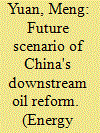| Srl | Item |
| 1 |
ID:
169836


|
|
|
|
|
| Summary/Abstract |
Unavoidable disruptions in the international oil supply create heavy pressures on the downstream oil market for oil-importing countries, especially China, whose high dependency on imported oil makes its downstream oil supply security an urgent issue. However, little attention has been paid to the supply security of the downstream oil industry with respect to dealing with import disruptions. Here, an integrated quantitative assessment framework is established to identify the impact of crude oil import disruptions on downstream oil supply security from the supply chain perspective. The dynamic scheduling process of the downstream oil supply chain under 72 import disruption scenarios is simulated by coupling a mathematical programming model with Latin hypercube sampling. The improved grey incidence evaluation method is applied for the comprehensive assessment of province-level and region-level oil product supply security based on the simulation results. The case of 31 provincial-level administrative regions in China in 2017 and 2020 is analysed as an example to demonstrate the framework. We find significant differences among provinces. The southwest and eastern coastal areas of China are vulnerable to potential oil supply disruptions, while the northwest China enjoys high supply security. Based on the results of this paper, policy implications are provided for the Chinese government. The design framework is not case-specific and can be applied for the quantitative assessment of other countries or regions.
|
|
|
|
|
|
|
|
|
|
|
|
|
|
|
|
| 2 |
ID:
176766


|
|
|
|
|
| Summary/Abstract |
Improving energy supply efficiency and quality is regarded as a key pathway to shifting towards a fully sustainable energy system. To address the low efficiency and high emissions in the downstream oil industry caused by the problem of vertically integrated monopoly, the Chinese government is making an effort to promote a multiproduct pipeline network reform. The fundamental and indispensable step for this goal is the pipeline network interconnectivity. This paper quantifies the energy-environmental impacts of the pipeline network interconnectivity reform on China's downstream oil supply chain to 2030. An integrated framework is developed to obtain the detailed design-scale information required for assessment, introducing demand forecasting and demand reallocation into a pipeline network optimal planning model. The model is formulated as a fuzzy mixed integer linear programming that optimizes the infrastructure development scheme and supply chain operation plan simultaneously while taking into account demand uncertainty. The results show that, compared with the baseline, the pipeline interconnectivity reform could reduce yearly energy consumption and CO2 emissions by 9.7–19.8% and 12.5–17.9%, respectively. It is shown that this reform policy could overcome infrastructure constraints, increase pipeline utilization, and improve both energy and environmental performance. The proposed framework can be a theoretical guideline for policymakers within and beyond China.
|
|
|
|
|
|
|
|
|
|
|
|
|
|
|
|